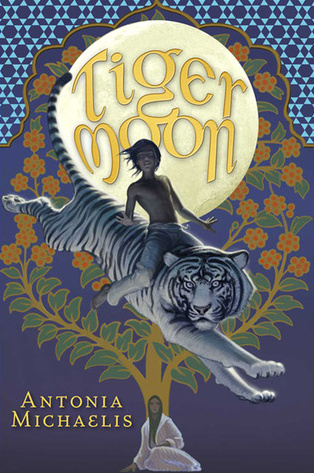

“A story isn't a good one unless it has a good listener”
― Antonia Michaelis, quote from Tiger Moon
“The Rajah's handsome eunuch never guessed that she was telling him the tale of her own life.”
― Antonia Michaelis, quote from Tiger Moon
“Get in," he told Nitish.
"What, me?"
"No," said Farhad, "one of the other twenty-six white tigers waiting to cross the river.”
― Antonia Michaelis, quote from Tiger Moon
“You don't understand at all. It doesn't matter what's true and what's a fairy tale. That's not what matters. The dividing lines aren't as straight and simple as you think. - Raka”
― Antonia Michaelis, quote from Tiger Moon
“The salty fluid of life... the crystal-clear blood of the earth... That's what it is, Farhad. Tears. - Nitish”
― Antonia Michaelis, quote from Tiger Moon

“Whoa, the baby Jesus lives in Chamberlain?” “In an igloo next to the inn. Try again.” “Um,”
― Chris d'Lacey, quote from Fire Star
“His instincts should have warned him sooner than they had, but thanks to his agimortus, he'd been hobbled like a brood mare waiting to be mounted by a randy stallion”
― Larissa Ione, quote from Eternal Rider
“Of course you did ; the law says you have the right to hold a nigger, but begging the law’s pardon, it lies. Yes, Epps, when the law says that it’s a liar, and the truth is not in it. Is every thing right because the law allows it ? Suppose they’d pass a law taking away your liberty and making you a slave?”
― Solomon Northup, quote from Twelve Years a Slave
“You realize how small you are in the grand scheme of things. We’re not really the rulers of this planet, we’re just tenants, and it’s the small stuff, the bacteria and insects and the plant matter that really runs it all. Even the big stuff, the nasty, scary stuff, it’s all pretty small in the grand scheme of things, isn’t it?”
― quote from Worm
“Sorridi in pubblico, piangi in pubblico, vivi in pubblico, crepa in pubblico. C'era, sui loro visi, un'emozione schietta, atipica per gli attori. Stasera erano al telegiornale. E' la cosa peggiore veder soffrire i propri figli.”
― Angela Carter, quote from Wise Children
BookQuoters is a community of passionate readers who enjoy sharing the most meaningful, memorable and interesting quotes from great books. As the world communicates more and more via texts, memes and sound bytes, short but profound quotes from books have become more relevant and important. For some of us a quote becomes a mantra, a goal or a philosophy by which we live. For all of us, quotes are a great way to remember a book and to carry with us the author’s best ideas.
We thoughtfully gather quotes from our favorite books, both classic and current, and choose the ones that are most thought-provoking. Each quote represents a book that is interesting, well written and has potential to enhance the reader’s life. We also accept submissions from our visitors and will select the quotes we feel are most appealing to the BookQuoters community.
Founded in 2023, BookQuoters has quickly become a large and vibrant community of people who share an affinity for books. Books are seen by some as a throwback to a previous world; conversely, gleaning the main ideas of a book via a quote or a quick summary is typical of the Information Age but is a habit disdained by some diehard readers. We feel that we have the best of both worlds at BookQuoters; we read books cover-to-cover but offer you some of the highlights. We hope you’ll join us.